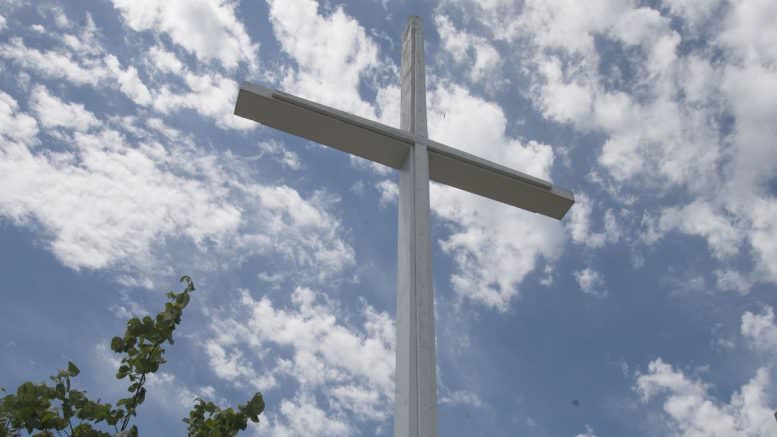In response to a lawsuit asking for the removal of the large white cross at Bayview Park, the city of Pensacola says they will defend the cross as a non-religious symbol and historic memorial to war veterans.
The American Humanist Association’s Appignani Humanist Legal Center and the Freedom From Religion Foundation filed the suit in May on behalf of Pensacola residents Amanda Kondrat’yev, Andreiy Kondrat’yev, Andre Ryland and David Suhor.
The humanist groups and the plaintiffs argue that the cross violates the Establishment Clause of the First Amendment of the Constitution, which requires the separation of church and state and guarantees freedom from governmental interference in both private and public religious affairs of all kinds. The lawsuit asks the court to declare the cross unconstitutional and to require the city to remove it. It also asks the court to prohibit the city from displaying crosses on public land in the future.
In their response filed July 11, the city stated the most recent cross constructed at Bayview was erected in 1969, is a historical military marker, and is not in violation of the First Amendment Establishment Clause.
“It was paid for by money raised by the Pensacola chapter of the Jaycees,” stated the official city response to the complaint. “The cross is a permanent marker recognizing an annual community gathering that was first held on Easter of 1941, when the world was at war and this country was only months away from formally joining that conflict.”
The city’s response goes on to detail the first “sunrise service” at the cross in 1941, organized by the Junior Chamber of Commerce, later known as the Jaycees, and includes a lengthy list of military personnel who were at the service, including city, Army and Navy officials. The document notes sunrise services with thousands of attendees took place sporadically from 1941 to 1969, “in memory of those departed.” The city document goes on to suggest that a reasonable observer aware of the history of the cross would not view it as an endorsement of religion, although before the response document, a history of the cross was not readily available.
The city constructed a Bayview Master Plan in 2011, offering a small segment devoted to the history of Bayview Park, which offered no mention of a historically significant cross with military relevance.
Suhor believes the city’s response to the complaint is insulting to Christians and veterans.
“No reasonable observer (history hidden or not) sees the cross as a war memorial, or even a memorial to previous Easter gatherings,” Suhor wrote in an email. “Everyone knows the cross is there for one reason — for Easter Sunday and local Christian culture.”
If the city insists on defending the cross, Suhor said they should embrace its real meaning and recognize that it is there to honor Jesus and Christians.
Suhor offered a solution to the current suit, stating the complaint would go away if the city would agree to move the cross to a more visible location on privately owned property.
Source: www.pnj.com




